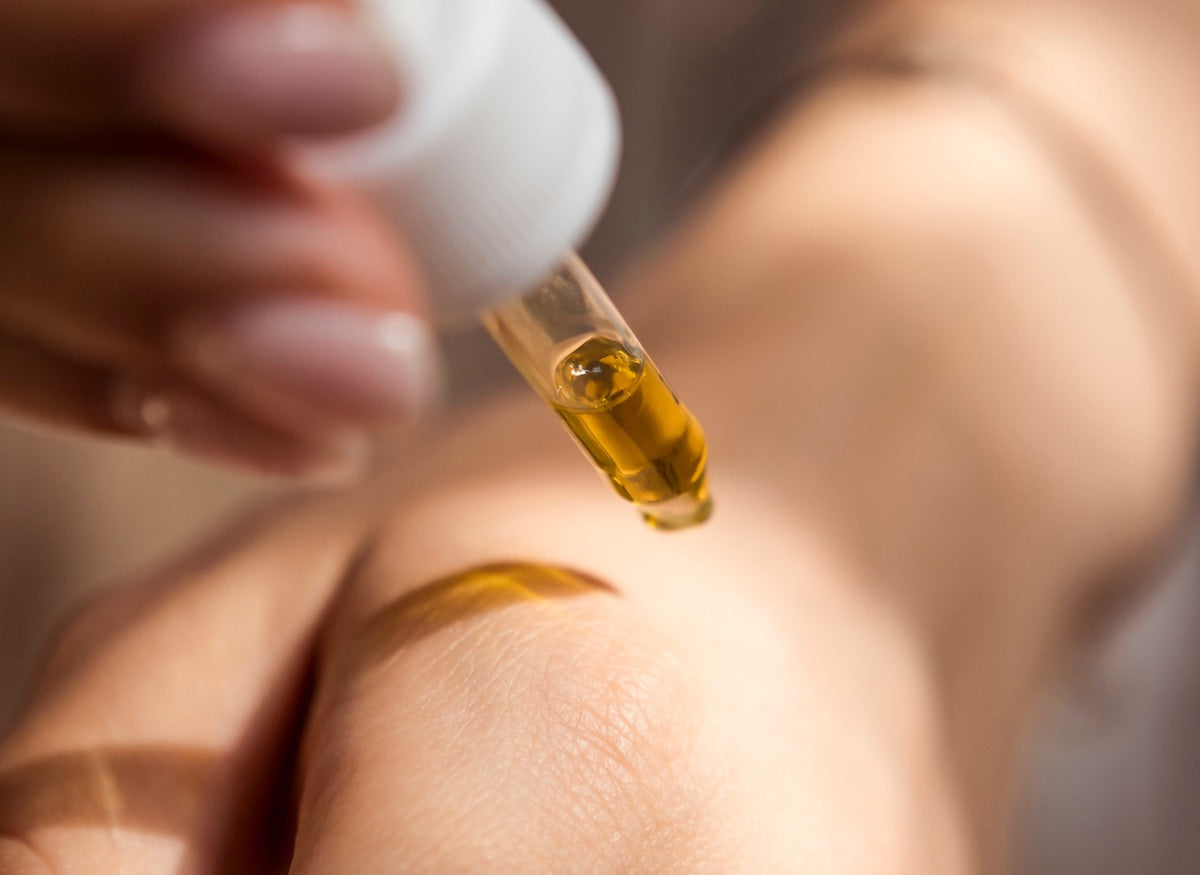
Why are the best natural skin care products always water-free?
Vicky LyonsWhen we founded Lyonsleaf, we decided we wanted to make natural skincare products. Not a little bit natural, but 100% natural. (you can read more about why we made that decision here) We soon realised, being natural mean being water free.
But what’s wrong with water in skin care? We’re 70% water, how could it do any harm to our skin? Well, The problem isn’t the water itself – it’s actually the other ingredients that must be added to stabilise the product if it is a mixture of oil and water. There are two ingredients in water-based skin care that cause all the trouble: preservatives and emulsifiers.
Preservatives in cosmetics
Preservatives are added to prevent the growth of any bacterial or fungal life in the product. They are absolutely essential in any product with an aqueous element (water, juice, hydrosol etc), whether that skin care product claims to be natural or not.
On the ingredient list you can look out for preservatives such as Parabens, Sodium benzoate, Potassium sorbate, Phenoxyethanol, Methylisothiazolinone (MIT) and Methylchloroisothiazolinone (CMIT), but preservatives have many (often un-pronounceable) different names. The easiest way to be sure, is to see if there is an aqueous ingredient (usually the first ingredient). If there is then there must be a preservative present. If you come across a product that does contain water and it doesn't have a preservative, then the product is both illegal and dangerous and could make you ill if it enters your body via the eyes, mouth or a cut.
Around 10 years ago there was some evidence that emerged linking Parabens to Breast Cancer read more. In response, many cosmetic companies frantically switched to other preservatives and advertised their products as ‘Paraben free’. A new ingredient, Phenoxyethanol was favoured in ‘natural’ cosmetics and was even permitted in organic preparations for a while, however, it is now banned in organic skin care as, once data became available over time, it was found that repeated exposure was worsening skin in some people read more and other studies have shown Neurotoxic effects read more (sadly, this study references testing on animals, something we are very much against and is another reason for us not use these sort of ingredients in our skin care).
Over the last decade have been great efforts to make safer, more natural preservatives, Benzyl Alcohol, Sorbic Acid and Dehydroacetic Acid are examples of these, but the problem is they are still designed to kill bacteria in the product. And once a preservative is on your skin it doesn’t stop doing that job - these chemicals don't just kill bad bacteria, they can also damage the delicate balance of your skin's microbiome. We have only recently begun to understand the importance of the skin’s natural bacteria, some people react badly to the preservatives in skincare and there is still no magic formula that uses preservatives that is ok for all skin types. Studies have made it clear that the damage caused by preservatives does disrupt the microbiome and can increase visible signs of ageing long term. Read more So, if you want to keep the “friendly” protective bacteria on your skin then keep out of the way of preservatives in skin care. And if you want preservative-free skin care it has to be water-free.Emulsifiers
Emulsifiers are ingredients required in water-based skin care to dissolve added oils – unfortunately, they do exactly the same thing to the natural oils of our skin. The main protective layer of our skin is called the Stratum Corneum. It’s basically a shield made of dead skin cells sat in a mixture of lipids, and it exists to keep pathogens out and water in. You can read more about how your skin works here. The Stratum Corneum has to work really hard because soap, cleanser, air conditioning and of course the weather all assault it on a daily basis. But there's really no need for your skin care to attack it too.
When you apply a water-based product to your skin, the emulsifier doesn’t stop emulsifying – it works its way through the stratum corneum, dissolving the oils as it goes and effectively destroying the protective barrier. What this means is that small cracks appear and then moisture is lost from the skin's surface, drying it out. Your skin tries to replace this moisture from the dermis below, but the moisture keeps escaping, and in turn, the dermis itself dries out. This is not good, your dermis is like a big sponge, it should be saturated and plump. If it dries out the skin becomes saggy and unnecessary premature wrinkles appear. If your skin ever feels tight and dry just after using a moisturiser, you’ve probably experienced this washed-out effect, read more which for some people results in further skin issues.
For other people wash out effect causes the skin to overproduce oil in its frenzy to replace what the emulsifiers have dissolved, which then seeps out onto the skin causing an oily complexion and can lead to blocked pores.
When you are looking at the ingredients in your skin care look out for these emulsifiers: Butyl Stearate, Cetearyl Alcohol, Lactylates, Glutamates. Again like preservatives, there are many different ones. But if you want to be sure, check if your product has water and oil in it – if so, there is definitely an emulsifier in there too.
Water free natural skin care products - the benefits
Microbial life, just like us, needs water to survive. No water in your product means it can’t become a home for pathogens, which means there is no need for preservatives. Similarly, pure oil-based products don’t need an emulsifier because there is no water to mix, so by being water-free, we can avoid the damaging ingredients and give you a natural skin care product that is 100% active ingredients, all working for the benefit of your skin.
You also achieve much better skin hydration when you choose water-free. When you use a plant oil based skin care product you will naturally seal in moisture and keep your skin hydrated for much longer because plant oils contain the very same fatty acids your epidermis uses to fortify the outer barrier. We advise moisturising after a bath or shower or after oil cleansing, so you add the water to your skin at home. Lyonsleaf products also contain humectants that draw moisture from the air (shea butter or beeswax). And of course you should keep yourself hydrated. Your dermis draws water from within, and your epidermis draws water from the dermis. And better hydration means plumped, glowing skin with less premature wrinkles and lines.
Why is water so widely used in skin care
Now you know what these ingredients do to your skin, I bet you are asking why they are even there? Here’s the bad news (if you haven’t guessed yet) it is not for the benefit of your skin. Natural oils are more expensive than cheap mineral oils (from petrochemicals) but water is virtually free. So by adding water and the necessary preservatives and emulsifiers the manufacturer saves money and dilutes the active ingredients. A big pot for a cheaper price is much easier to sell. A water-based product can be more than 80% water. Not good for your skin but really good for the manufacturer’s bottom line. You will also notice that you need to reapply more regularly. When you apply a water based product to your skin, it will briefly plump the epidermis, and skin feels hydrated, however because you are not sealing this moisture in, this will quickly evaporate and you will need to reach for the tub again and you will use much more each time - so you’ll soon be back buying more.
We often receive criticism at Lyonsleaf that our products are small for the price, but once people realise how little they have to use each time (80% less than a watery product) they realise a small pot actually lasts for ages.
Is oil-based natural skin care bad for my skin type?
Many people assume a water-free approach is just for a certain type of skin, but this really isn’t the case – everyone needs a strong skin barrier, and the natural antioxidants in plant oils are universally good at reducing both irritation and signs of ageing. Here’s how oil-based natural skin care can help your skin type.
Skin care for difficult skin
If you have difficult skin, water-free skin care is perfect for you. The gentle oils and lack of potential irritant ingredients work amazingly fast to soothe the skin, helping maintain the skin barrier to remain normal and healthy.
Skin care for dry skin
Oil-based skin care can work wonders for dry skin. If you find that no matter how many products you try and how much moisturiser you use, you just can’t keep your skin hydrated, give water-free skin care a go . Often, all it takes to transform your skin from dull and dry to smooth, vibrant and hydrated is a healthy supply of resources. It’s almost like feeding it with everything it needs.
Skin care for oily skin
It’s often said that people with oily skin should steer clear of oily products in their skin care routine, because they could end up worsening any problems. Using water-free products on oily skin beautifully balances oily skin and maintains the healthy skin barrier.
We only use non-comedegenic oils at Lyonsleaf, we see the plant oil soothing glands, helping the skin to maintain its normal function itself.
So if toners, moisturisers, and all the washing in the world never seem to work for you, it might be time to try a new approach.
Reducing your carbon footprint
The water-free skin care movement isn’t just great for skin – it’s great for the environment too. Beyond cutting down on water usage, water-free products also reduce carbon emissions. Since the ingredients in them are undiluted, a much smaller pot is required, saving packaging resources and there is 80% less weight and volume being transported to the customer.
Join the Revolution
So If you want to keep your skin in tip top condition, maintain a healthy skin barrier or just want to avoid artificial chemicals – join the water free revolution. We recommend starting with Lyonsleaf Beauty Balm and the oil cleansing method and if you are one of those people that hasn't quite found the right cosmetic cleansing, moisturising product.
We hope you've found this informative - please tell us what you think in the comments
Thanks and Best Wishes
Vicky
Founding partner and MD at Lyonsleaf :)





